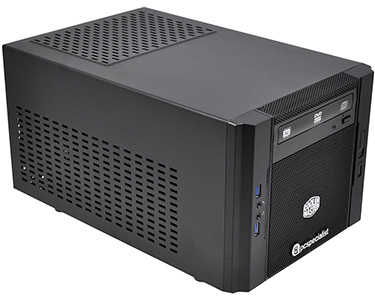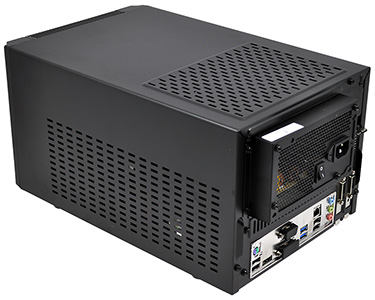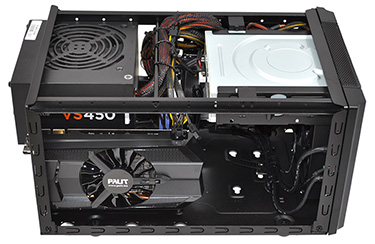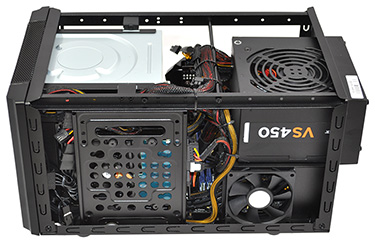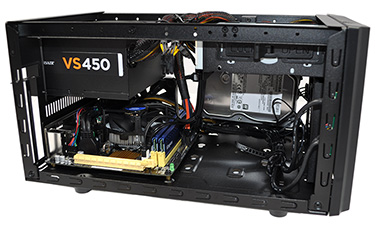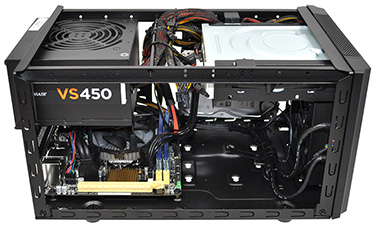Introduction
Keeping within budget has to be one of the biggest challenges when buying a new PC. With so many attractive technologies vying for your attention, it's oh so easy to concede to the lure of a faster CPU, better graphics or more storage. But is a lot of what's on offer overkill for most users?
There are two sides to the argument, but with the hardware that's on offer today, consumers should, we feel, be able to put together a capable gaming rig for around £500. Taking away the guesswork, UK system integrator PC Specialist reckons it has just the system to fit the bill in the form of the new Vanquish Mini 130.
Priced at £549, this small-form-factor (SFF) machine is, in many ways, our kind of PC: it's not too big, it has a capable fourth-generation Intel Core processor and gaming potential served up through dedicated Nvidia GeForce graphics.
Granted, we're enthusiast users at heart and enjoy a good dose of top-notch performance, but we're also pragmatists who revel in a good deal. On the face of it, the Vanquish Mini 130 looks to be exactly that.
We're seeing a surge in SFF solutions from all of the UK's biggest system builders, and PC Specialist's chassis of choice - Cooler Master's Elite 130 - is proving popular. The same case was featured in Scan's 3XS Nanu Gamer, and at 377mm x 240mm x 205mm (DxWxH) in size, it's well-suited to budget mainstream builds.
Though not the most visually-striking chassis you'll ever see, the Elite 130 has enough room to house most existing components, making it easy to specify and build a gaming-capable PC. The only obvious caveat is that the ATX PSU - in this case a Corsair VX450 - is designed to protrude from the rear of the chassis. You probably won't see it when the system is in situ, but you'll always know that it's an inelegant way of maintaining support for older components.
Ideally positioned on top of a desk, the chassis puts good connectivity options within easy reach. These include dual USB 3.0 ports, a single USB 2.0 port, audio and microphone jacks, and a DVD writer.
What components would you choose for a £549 build in an Elite 130 chassis? That's an interesting challenge in itself, so it's with intrigue that we explored PC Specialist's selection. The foundation for the build is an entry-level Asus H81I-Plus Mini ITX motherboard that offers two DDR3 memory slots (supporting up to 16GB of RAM), a PCIe 2.0 x16 slot, two SATA 6Gbps ports (plus two SATA 3Gbps), Realtek ALC887 audio and Realtek Gigabit Ethernet. There's no integrated WiFi functionality - that's reserved for Asus's costlier models - yet the H81I-Plus has the basics covered.
One of the biggest contributors to overall cost tends to be the processor, so PC Specialist has understandably played it safe with a stock-clocked Intel Core i3-4130. This is a dual-core, hyper-threaded part that's capable of running at up to 3.4GHz while keeping within a 54W power envelope, and it's partnered with Intel's low-profile reference cooler.
Joining the fourth-generation Intel Core chip is 8GB of Kingston Hyper-X Genesis 1,600 DDR3 memory and dedicated graphics in the form of a 2GB Palit GeForce GTX 660. This was a firm favourite among Nvidia's last-generation crop, yet it remains a cost-effective solution and should do well when tasked with running modern games.
Removing the graphics card to get a closer look inside reveals that PC Specialist's build is neat and tidy throughout. The cables from the non-modular PSU are well-managed and tied down appropriately so as not to block the chassis' front intake fan, and despite the limited size it's surprisingly easy to get access to most components for future upgrades.
As far as component selection is concerned, the only potential shortcoming is the 1TB Toshiba hard disk (model DT01ACA100). Despite offering good capacity, we'd much rather have seen, say, a similarly-priced 500GB Seagate hybrid drive that combines reasonable capacity with the performance benefits of flash storage.
Finishing off the system is a 64-bit install of Microsoft's Windows 8.1 operating system and a three-year warranty that includes collect-and-return cover for the first 12 months. Our review sample came armed with all the latest applicable drivers and software updates, though it wasn't an entirely 'clean' setup: Bullguard Internet Security was installed on top and, as Windows now has built-in security, we class most of these third-party solutions as unnecessary.
Overall, there doesn't appear to be much to criticise on PC Specialist's specification sheet. Component selection is generally good and the Vanquish Mini 130 should handle most tasks well. However, there is one problem that becomes evident as soon as you power on: the system is noticeably loud. Our noise meter recorded a reading of 40dB with the system idling, and that figure rose to 43dB under load.
Where you position your PC determines how much noise you're willing to put up with, but when used as a table-top solution, the Vanquish Mini 130 proved too vocal for our liking. We're staunch advocates of quiet PCs, and though budgetary constraints make sound profiling more difficult in a system such as this, we believe PC Specialist should be targeting an idle noise output of less than 35dB on all current-generation machines.
Enough talk about the build, let's see what kind of performance the Core i3 + GTX 660 combination can deliver.






